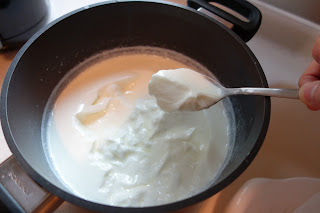My 2013 New Year's resolution has me trying to eat better and sustaining a more well-rounded diet. The approach is quite simple. I try to avoid things that have nutritional ingredients that I cannot pronounce at regular talking speed, I try to cook more and finally, I try eat anything that has been labelled a "super food"*.
Which brings me to one of the things about Hong Kong. Living in the United Kingdom (and even Australia) had me spoilt for choice. The sheer volume and demand for products afforded great selection at a reasonable price. Supermarkets here are slightly different, there's an obvious bias towards Regional and Cultural products. The selection of Asian Groceries is phenomenal! Preserved Chinese Sausage, Dried Scallops, Salted Duck Eggs from bean curd to frozen dumplings the variety is overwhelming. Unfortunately, if your pallet lacks the sophistication and culture as mine you sometimes find that standard items are hard to come by or have been whacked with import costs pushing it from 'innocent craving' to 'splurge item'.
It's not that I don't trust China, it's just well, I scare easily and the stories of Chinese cost cutting make me question the quality of certain items. Take chicken for example, non-organic and caged (ie. Not free range). I can purchase, 3 relatively large chicken breasts from China for $30 HKD, the same supermarket will also stock chicken from Thailand ($40 HKD), The Netherlands ($70 HKD) and Australia ($120 HKD). It's easy to see that shipping and transportation bear significance on the final price, but when you're weighing up value for money versus quality, I sometimes wonder if I'm getting horse meat, or something more sinister ...
The point of this post is, unless there's a local Chinese factory producing the item, you will undoubtedly be paying a premium on these items. Which is warranted, the local population have little interest in specialised food which means for a Chinese factory to produce a niche item, it's probably not going to be on the back of generating profit. That's not to say that you don't have local/specialised factories and suppliers but they have drifted into an almost 'boutique' status, which of course carries the boutique price tag.
Two items that I cannot find locally produced and often buy imported from overseas is Greek Yogurt and Cottage Cheese. The HK market rate for Cottage Cheese is around 15 HKD/100 grams and Greek Yogurt at 12 HKD/100 grams (If anybody knows cheaper, please let me know!). So with a little bit of Milk, a thermometer, cheese cloth and some time I embarked on a little DIY cheese and yogurt adventure...
*: I know I shouldn't subscribe to these marketing gimmicks. Chia seeds, Quinoa, Apple Cider Vinegar, Blueberries, Kale, I'm a sucker.















